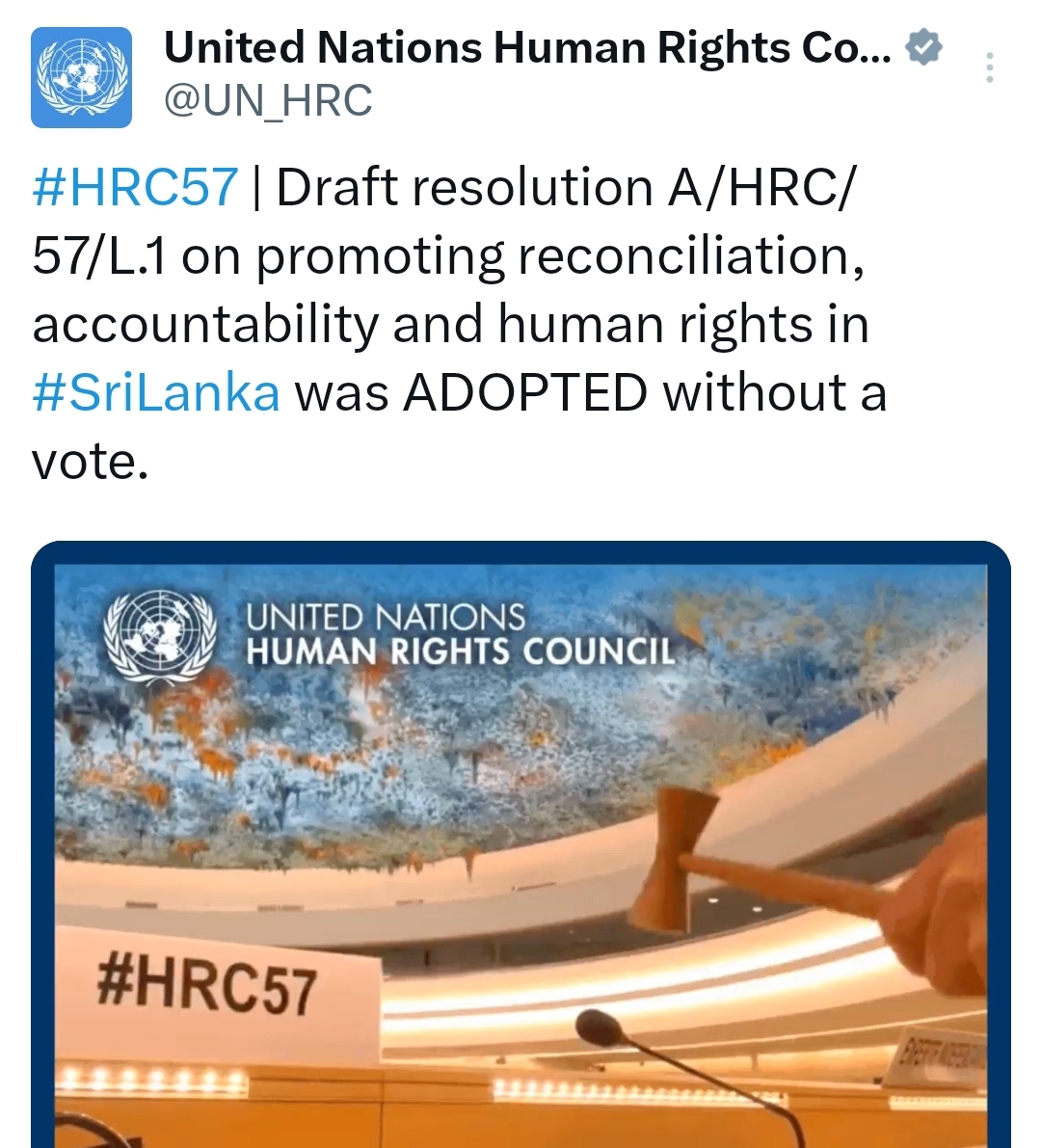The United Nations Human Rights Council (UNHRC) has adopted a resolution promoting reconciliation, accountability, and human rights in Sri Lanka, despite being rejected by the country’s new government.
The resolution, passed without a vote during the Geneva session, extends the mandate of a mechanism aimed at gathering evidence of alleged war crimes in Sri Lanka for another year.

Statement delivered by Sri Lanka’s Permanent Representative to the United
Nations at the 57th Session of the Human Rights Council in Geneva
9th October 2024
Mr. President,
As the country concerned in respect of draft resolution 57/ L.1, as authorized by the newly elected Government in Sri Lanka, let me brief the Council on the latest developments in the country.
Following the model conduct for a free, fair and peaceful election followed by a dignified transition in keeping with our decades of democratic practice, H.E. the President Anura Kumara Dissanayake was sworn in as the 9th Executive President of Sri Lanka on 23 September.
Next month, the people of Sri Lanka will exercise their franchise once again to elect a new Parliament, enabling the Government to move forward with a strengthened mandate to deliver on the people’s expectations for a new political culture in the country. The rule of law, transparency, accountability and reconciliation will prevail in order to ensure sustained economic growth and social well-being of all our citizens.
In line with the aspirations of the people, the Government will prioritize integrity, and ethical governance including addressing issues of mismanagement and corruption that were at the root of the economic collapse.
The Government will protect democracy and human rights of all citizens including addressing past issues. Domestic mechanisms and processes that deal with reconciliation, accountability and justice will be credible and independent within the Constitutional framework, and a truth and reconciliation process that has the people’s trust will be operationalized. As stated by H.E the President ‘Our aim is to make domestic mechanisms credible and sound…’
As directed by H.E. the President, investigative authorities have already announced redoubling of investigation into a number of clearly identified accountability cases that were pending from the past.
Justice will be delivered to the victims of the senseless Easter Sunday attacks.
The Government is committed to a Sri Lankan nation that respects diversity and equal citizenship for all without discrimination consistent with our Constitution and our Treaty commitments. Administrative, political and electoral processes will be activated towards this end.
The Government has received the mandate from the people and the encouragement of the international community as we move forward on these fronts.
Mr. President,
Now with regard to the draft resolution before us:
Draft resolution 57/L.1 extends the mandates contained in Human Rights Council resolution 51/1.
Sri Lanka has opposed HRC resolution 51/1 and the preceding HRC resolution 46/1 under which an external evidence gathering mechanism has been established within the OHCHR.
We also disassociated from the Report of the High Commissioner, for the reasons outlined in our detailed response to this Council contained in document A/HRC/57/G/1.
Resolution 51/1 was tabled without Sri Lanka’s consent as the country concerned, and was adopted by a divided vote. As such, any subsequent decision extending mandates established by this resolution lack consensus in the Council.
As we have repeatedly reminded this Council, setting up of this external evidence gathering mechanism within the OHCHR is an unprecedented and ad hoc expansion of the Council’s mandate, and contradicts its founding principles of impartiality, objectivity and non-selectivity.
No sovereign state can accept the superimposition of an external mechanism that runs contrary to its Constitution and which pre-judges the commitment of its domestic legal processes. Furthermore, many countries have already raised serious concerns on the budgetary implications of this mechanism given its ever-expanding mandate.
For the above reasons, we are obliged to reject the draft resolution which is tabled before this Council today seeking to extend the mandate of Resolution 51/1.
Mr. President,
Notwithstanding our rejection of the Resolution, Sri Lanka will continue its longstanding constructive engagement with this Council including with regular human rights bodies, and all core Human Rights treaties to which we are party, as well as our commitments under the UPR process. We will keep the Council updated on the progress we make.
I would also like to express appreciation for the principled positions taken by many countries in this Council in support of Sri Lanka as we enter a new chapter in our country.
At a time of intense cynicism and polarization within the multilateral arena on human rights and humanitarian situations in the context of the on-going travesties of these norms, we urge the co- sponsors of this politicized draft resolution which we oppose, to support and encourage the Government’s clear intention to address human rights and reconciliation through domestic processes and in line with our international obligations.
I thank you Mr. President.
